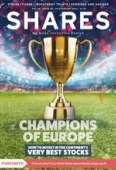Why it matters that Nvidia is one of a small number of stocks which dominate the market

At 10pm UK time last Wednesday (21 February) traders around the world would have been watching their monitors waiting for the latest quarterly results from Nvidia (NVDA:NASDAQ) to drop. A lot was riding on them as even a mildly disappointing showing from the AI chip star could well have triggered a wave of selling. As it turned out, Nvidia smashed it again.
The company declared an AI ‘tipping point’ as revenue surged by a remarkable 265% over last year and 22% on the prior quarter. The company posted $22.1 billion in revenue versus the $20.55 billion forecast, with earnings of $4.93 per share against $4.64 estimates.
But take a step back and ask yourself – how healthy is it for the fortunes of the market to be so caught up with a single stock even if only in the short term?
Market concentration is not an isolated or new risk for investors. According to portfolio manager Sean Peche at Ranmore Fund Management, the Magnificent Seven (Alphabet (GOOG:NASDAQ), Amazon (AMZN:NASDAQ), Apple (AAPL:NASDAQ), Meta Platforms (META:NASDAQ), Microsoft (MSFT:NASDAQ), Nvidia, Tesla (TSLA:NASDAQ)) are worth more than the stock markets of Japan, France, the UK and Mexico combined.
Javier de Berenguer, investment manager and fund selector at Spanish insurance company Mapfre, says: ‘What is clear is that this market concentration in only those seven companies leaves great opportunities outside of them, as is the case in the pharma sector. Though there is no spotlight on them, there are numerous high-quality companies generating impressive cash flows amid little cyclical sensitivity. We believe they should be included in a diversified portfolio.’
We often talk about the benefits of diversification and right now a lot of eggs are in the Magnificent Seven basket. Anyone holding a product which tracks the MSCI World index would have nearly 20% exposure to these names and anyone with an instrument which aims to match the S&P 500 faces a similar issue.
This could be an argument for looking at achieving equal weighted exposure to the markets, where market cap doesn’t come into it, and there are a (relatively limited) number of products which offer the ability to achieve this.
However, some investors will look at the returns of the S&P 500 Equal Weighted index and its vanilla counterpart, see the superior performance of the latter and say they want a piece of the Magnificent Seven action. While you can debate their valuations, there’s no question these are highly innovative businesses with significant growth potential. They are also not all created equal either in size or quality.
It comes down to a judgement call for investors. What’s important is they make this judgement with their eyes open and understand that, to quote Ranmore’s Peche, being ‘long Magnificent Seven’ is the ‘most crowded trade’ out there right now.
Important information:
These articles are provided by Shares magazine which is published by AJ Bell Media, a part of AJ Bell. Shares is not written by AJ Bell.
Shares is provided for your general information and use and is not a personal recommendation to invest. It is not intended to be relied upon by you in making or not making any investment decisions. The investments referred to in these articles will not be suitable for all investors. If in doubt please seek appropriate independent financial advice.
Investors acting on the information in these articles do so at their own risk and AJ Bell Media and its staff do not accept liability for losses suffered by investors as a result of their investment decisions.
Issue contents
Daniel Coatsworth
Editor's View
Feature
- How Latin American emerging markets compare
- Emerging markets: China positive policy moves, US rates shift and what’s happening in Latin America
- Find out what Terry Smith thinks about obesity drugs and AI
- How intangibles can be used to identify great businesses
- Champions of Europe: how to invest in the continent’s best stocks
- Merger activity in the property sector heats up with bid battle for API
- Why is Diversified Energy launching a tender offer and what are investors’ options?
Great Ideas
News
- Seraphim reaches for the stars with 31% year-to-date gains
- Brakes slammed on Mobico recovery as results delay frustrates investors
- Competition authority finds ‘fundamental concerns’ in the UK housebuilding market
- Berkshire cash hits record $168 billion as deals dry up
- Japan’s Nikkei 225 hits all-time high, but what is the next move for investors?

 magazine
magazine








